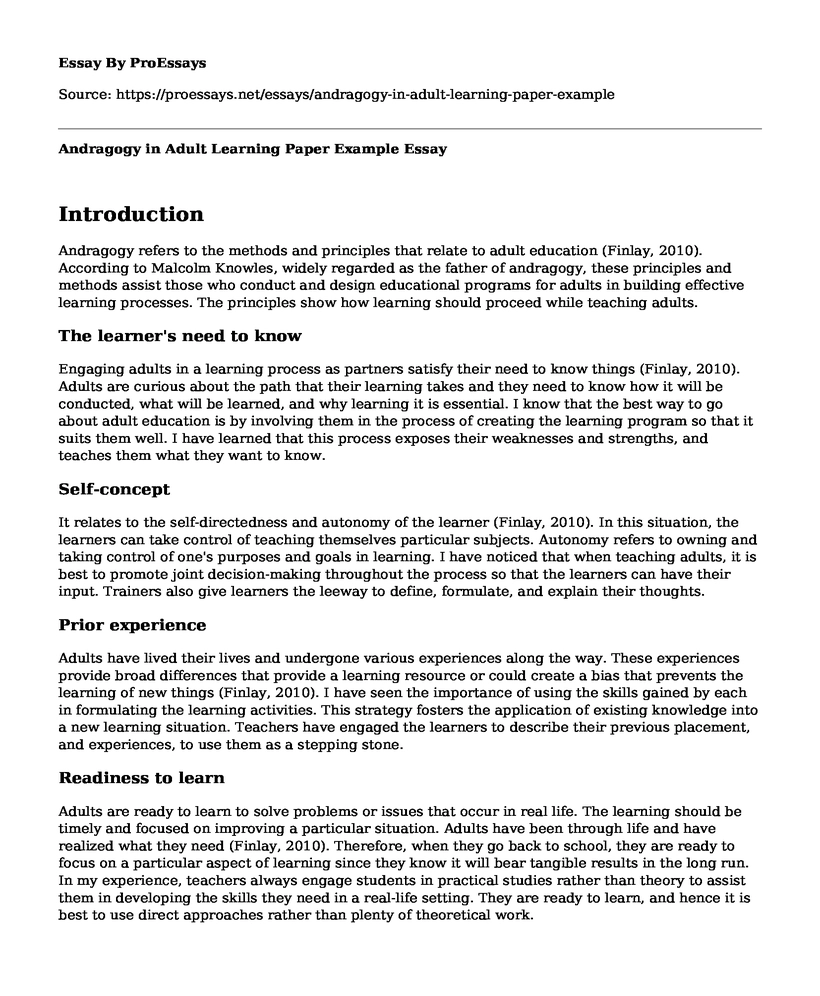Introduction
Andragogy refers to the methods and principles that relate to adult education (Finlay, 2010). According to Malcolm Knowles, widely regarded as the father of andragogy, these principles and methods assist those who conduct and design educational programs for adults in building effective learning processes. The principles show how learning should proceed while teaching adults.
The learner's need to know
Engaging adults in a learning process as partners satisfy their need to know things (Finlay, 2010). Adults are curious about the path that their learning takes and they need to know how it will be conducted, what will be learned, and why learning it is essential. I know that the best way to go about adult education is by involving them in the process of creating the learning program so that it suits them well. I have learned that this process exposes their weaknesses and strengths, and teaches them what they want to know.
Self-concept
It relates to the self-directedness and autonomy of the learner (Finlay, 2010). In this situation, the learners can take control of teaching themselves particular subjects. Autonomy refers to owning and taking control of one's purposes and goals in learning. I have noticed that when teaching adults, it is best to promote joint decision-making throughout the process so that the learners can have their input. Trainers also give learners the leeway to define, formulate, and explain their thoughts.
Prior experience
Adults have lived their lives and undergone various experiences along the way. These experiences provide broad differences that provide a learning resource or could create a bias that prevents the learning of new things (Finlay, 2010). I have seen the importance of using the skills gained by each in formulating the learning activities. This strategy fosters the application of existing knowledge into a new learning situation. Teachers have engaged the learners to describe their previous placement, and experiences, to use them as a stepping stone.
Readiness to learn
Adults are ready to learn to solve problems or issues that occur in real life. The learning should be timely and focused on improving a particular situation. Adults have been through life and have realized what they need (Finlay, 2010). Therefore, when they go back to school, they are ready to focus on a particular aspect of learning since they know it will bear tangible results in the long run. In my experience, teachers always engage students in practical studies rather than theory to assist them in developing the skills they need in a real-life setting. They are ready to learn, and hence it is best to use direct approaches rather than plenty of theoretical work.
Orientation to learning
The role of current experiences in shaping the need to learn is crucial. Adults prefer to learn in a setting where they are working to solve a problem as opposed to subject-oriented learning (Finlay, 2010). Adults will best learn when information presentation uses real-life scenarios. In my experience, allowing adults to reflect and observe on their current experiences will help them to generalize and develop theories that help them in new situations. I have seen this approach improve the learning of adults since they decide what is most important for studying
Motivation to learn
Adults are highly motivated to learn since it helps them in solving problems in their lives. Adults are more concerned about intrinsic payoffs rather than external factors (Finlay, 2010). Adults go to school because they want to and not because it is a requirement. They understand the importance of learning and gaining a certain skill. In my experience, teachers have always given adult learners the opportunity to set their targets and work towards them, since they know what they want. Attempting to control adults and set them targets has shown some resistance because adults know what is best for their lives.
Conclusion
Andragogy is a vital part of learning since adults are also in need of education. The six principles help educators in understanding how they should go about engaging adults successfully in the learning process. The experiences show how each principle was utilized to ensure that adult learning is as efficient as possible.
Reference
[Janet Finlay]. (2010, May 17). Andragogy (Adult Learning) [Video file]. Retrieved from https://www.youtube.com/watch?v=vLoPiHUZbEw&feature=youtu.be
Cite this page
Andragogy in Adult Learning Paper Example. (2022, Sep 22). Retrieved from https://proessays.net/essays/andragogy-in-adult-learning-paper-example
If you are the original author of this essay and no longer wish to have it published on the ProEssays website, please click below to request its removal:
- Of Cats and Swimming
- Lives of LGBTQ Students Annotated Bibliography
- Program Models for Educating Emergent Bilinguals
- Paper Example on Maximising Learner Potential: Inclusive & Equitable Teaching
- Essay Sample on Growth: A Critical Period in Child Development
- Essay Example on Child Neglect: Denial of Basic Needs, Severe Consequences
- Essay Example on Dropouts to the Rescue: Tennessee Needs College Graduates







